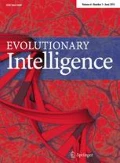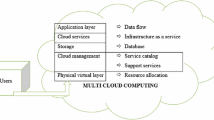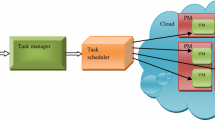Abstract
In the Internet era, cloud computing is evolved as the efficient distributed platform in the recent years. But the major issue related to the cloud platform is task scheduling. Allocating the suitable VM to the tasks is a challenging task in cloud computing. Many algorithms are proposed to optimize the scheduling process in the cloud environment. The existing algorithms have their own drawbacks. This paper proposed the hybrid model which uses the hierarchical process to prioritize the task before submitting to the scheduler. The Bandwidth-aware divisible task (BAT) scheduling model is modified by adding the Bar system model to develop the hybrid optimization mechanism. The Minimum overload and minimum lease policy is employed for applying the pre-emption in the data center to reduce the overload of the virtual machine. The performance of the proposed hybrid model is evaluated using different parameters. The simulation results prove the efficiency of the hybrid model.






Similar content being viewed by others
References
Liu Y, Xun Xu, Zhang L, Wang L, Zhong RY (2017) Workload-based multi-task scheduling in cloud manufacturing. Robo Computer-Integrated Manuf 45:3–20
Abdullahi M, Ngadi Md A (2016) Symbiotic Organism Search optimization based task scheduling in cloud computing environment. Future Gener Comp Syst 56:640–650
Agarwal Dr, Saloni Jain. (2014) “Efficient optimal algorithm of task scheduling in cloud computing environment.”arXiv preprint arXiv:1404.2076
Jang S H, Kim T Y, Kim J K, Lee J S (2012) The study of genetic algorithm-based task scheduling for cloud computing. Int J Control Autom 5:157–162
Boveiri H R, Khayami R, Elhoseny M, Gunasekaran M (2019) An efficient Swarm-Intelligence approach for task scheduling in cloud-based internet of things applications. J Ambient Intelligence Humaniz Computing 10(9):3469–3479
Wu X, Deng M, Zhang R, Zeng B, Zhou S (2013) A task scheduling algorithm based on QoS-driven in cloud computing. Procedia Comput Sci 17:1162–1169
Jena RK (2015) Multi objective task scheduling in cloud environment using nested PSO framework. Procedia Comput Sci 57:1219–1227
Li Y, Chen M, Dai W, Qiu M (2015) Energy optimization with dynamic task scheduling mobile cloud computing. IEEE Syst J 11(1):96–105
Kumar, Pardeep, A Verma. (2012). “Independent task scheduling in cloud computing by improved genetic algorithm.” International Journal of Advanced Research in Computer Science and Software Engineering 2(5)
Elaziz Abd, Mohamed S X, Jayasena KPN, Li Li (2019) Task scheduling in cloud computing based on hybrid moth search algorithm and differential evolution. Knowledge-Based Syst 169:39–52
Raju DN, Saritha V (2018) A survey on communication issues in mobile cloud computing. Walailak J Sci Technol (WJST) 15(1):1–17
Nagaraju D, Saritha V (2017) An evolutionary multi-objective approach for resource scheduling in mobile cloud computing. Int J Intell Eng Syst 10(1):12–21
Raju D N, Saritha V (2016) Architecture for fault tolerance in mobile cloud computing using disease resistance approach. Int J Commun Networks Inf Security 8(2):112
Tawfeek, Medhat A., Ashraf El-Sisi, Arabi E. Keshk, and Fawzy A. Torkey. (2013) “Cloud task scheduling based on ant colony optimization.” In 2013 8th international conference on computer engineering and systems (ICCES), pp. 64–69. IEEE.
Chen, W-N, Jun Z. (2012) “A set-based discrete PSO for cloud workflow scheduling with user-defined QoS constraints.” In 2012 IEEE International Conference on Systems, Man, and Cybernetics (SMC), pp. 773–778. IEEE
Lin W, Liang C, Wang JZ, Buyya R (2014) Bandwidth-aware divisible task scheduling for cloud computing. Softw Pract Exp 44(2):163–174
Li J-F, Peng J (2011) Task scheduling algorithm based on improved genetic algorithm in cloud computing environment. Jisuanji Yingyong/ J Comp Appl 31(1):184–186
Gai K, Qiu M, Zhao H (2016) Cost-aware multimedia data allocation for heterogeneous memory using genetic algorithm in cloud computing. IEEE Trans Cloud Comput 1(10):22–43
Maguluri ST, Srikant R (2014) Scheduling jobs with unknown duration in Clouds. IEEE/ACM Trans Netw (TON) 22(6):1938–1951
Cheng C, Li J, Wang Y (2015) An energy-saving task scheduling strategy based on vacation queuing theory in cloud computing. Tsinghua Sci Technol 20(1):28–39
Ergu D, Kou G, Peng Y, Shi Y, Shi Y (2013) The analytic hierarchy process: task scheduling and resource allocation in cloud computing environment. J Supercomput 64(3):835–848
Zhu X, Yang LT, Chen H, Wang J, Yin S, Liu X (2014) Real-time tasks oriented energy-aware scheduling in virtualized clouds. IEEE Trans Cloud Comput 2(2):168–180
Liu X, Zha Y, Yin Q, Peng Y, Qin L (2015) Scheduling parallel jobs with tentative runs and consolidation in the cloud. J Syst Softw 104:141–151
Handfield R, Walton SV, Sroufe R, Melnyk SA (2002) Applying environmental criteria to supplier assessment: a study in the application of the analytical hierarchy process. Eur J Oper Res 141(1):70–87
Del Acebo E, de-la Rosa JL (2008) Introducing bar systems: a class of swarm intelligence optimization algorithms. AISB conv commun, interact soc intell 1:18–23
Salehi M A, Javadi B, Buyya R (2014) Resource provisioning based on preempting virtual machines in distributed systems. Concurrency Comput Pract Exper 26(2):412–433
Calheiros R N, Ranjan R, Beloglazov A, De Rose C AF, Buyya R (2011) CloudSim: a toolkit for modeling and simulation of cloud computing environments and evaluation of resource provisioning algorithms. Software Pract exper 41(1):23–50
Author information
Authors and Affiliations
Corresponding author
Additional information
Publisher's note
Springer Nature remains neutral with regard to jurisdictional claims in published maps and institutional affiliations.
Rights and permissions
About this article
Cite this article
Sreenivasulu, G., Paramasivam, I. Hybrid optimization algorithm for task scheduling and virtual machine allocation in cloud computing. Evol. Intel. 14, 1015–1022 (2021). https://doi.org/10.1007/s12065-020-00517-2
Received:
Revised:
Accepted:
Published:
Issue Date:
DOI: https://doi.org/10.1007/s12065-020-00517-2




